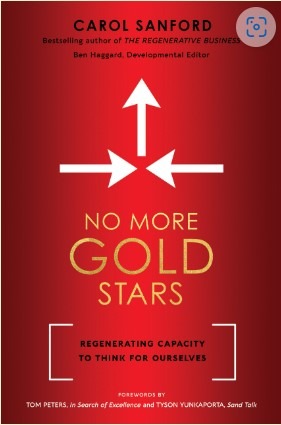
Rooted Leadership talk at Disrupt HR
Want to hear regenerative leadership explained in 5 minutes? Here’s a video of me speaking at Disrupt HR event in Nottingham. If you’d like to
I first encountered this book during my regenerative leadership residential training and admit taking it to bed and rushing through it in a night. At the heart of the book is a story – of Phil Jackson’s approach to the Chicago Bulls in the 1980s and his belief that basketball is fundamentally a collaborative activity with a purpose beyond winning.
However, when I returned to the book recently I read it slowly, savouring every one of Carol’s remarkable insights and I confess that it made my brain hurt. Perhaps this is not a surprise, given that Carol states early on that this is a book about ways of thinking. So be warned and give this slender book plenty of time and room for all its observations to sink in and become part of your ‘being’.
“It takes deep and diligent work to see the hidden machineries …that generate consensus reality. Helping others to see these machineries is even harder because they believe the puppet show. It’s not enough to tell them they are caught in a shadow play. To free them from the cave, one must build the capability and consciousness that will enable them to examine the hidden sources of their perceptions of reality. One must grow a culture and community of fellow seekers, each aiming to break the mechanical patterns of their thought”
At its core, the book advocates for a whole-system approach to work, emphasizing the importance of cultivating one’s inner capabilities and aligning personal values with professional endeavours.
The value for aspiring regenerative leaders is the explanations of how to build capacity in team-members to ‘consistently think at higher levels’, stepping back from the limelight and feeding the soil so that team-members thrive and grow.
One of the book’s strengths lies in Sanford’s ability to blend philosophical insights with practical strategies. She illustrates how individuals and organizations can harness the power of indirect work to foster innovation, creativity, and sustainable success.
The book challenges conventional leadership paradigms by emphasizing the importance of interconnectedness, collaboration, and fostering a culture of continuous learning and improvement.
I am left with the feeling that this endeavour is not easy (as I know it isn’t from my own work from aspiring regenerative practitioners) but that the effort to ‘create a new map’ as Sanford (and Einstein) advocate, is empowering, enriching, exciting and rewarding.
In summary, it’s a must-read for anyone seeking a deeper understanding of personal growth, purposeful work, purpose-led leadership and the paradigm shifts we need to create a world that aligns itself with creating life.
Sarah Spencer Supporting visionary leaders grow regenerative enterprises, inspired by living-systems success.
Check out our Regenerative Organisation Fundamentals Programme enrolling now: https://www.thinklikeatree.co.uk/product/regenerative-organisation-fundamentals/https://lnkd.in/eiRkUhwk
#regenerativeleadership #regenerativebuiness #sustainability

Want to hear regenerative leadership explained in 5 minutes? Here’s a video of me speaking at Disrupt HR event in Nottingham. If you’d like to

In “No More Gold Stars,” Carol Sanford challenges conventional notions of achievement and success. Carol is a renowned business consultant and educator and what struck

This week has felt a little bit epic! I have found myself taking deep, exhaling breaths as I sit with the medley of feelings I have